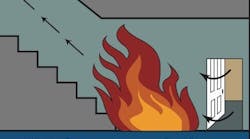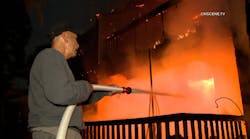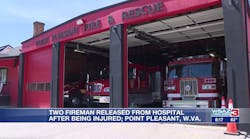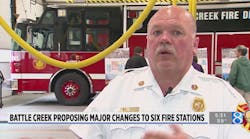Nov. 09--After a weekslong investigation, Anchorage fire officials still can't say for sure what caused a firefighter to fall more than 70 feet from a fire truck ladder in June.
No one, not even security cameras, saw the fall that left 29-year-old Anchorage firefighter and paramedic Ben Schultz hospitalized with a traumatic brain injury. That's one finding in an internal report from fire officials that also recommends policy changes to avoid repeating one of the most severe training accidents in the Anchorage Fire Department's history.
In the tight-knit fire department, bad injuries ripple in shockwaves and trigger intensive self-reflection about safety.
"It could be as simple as a misstep," Assistant Fire Chief Alex Boyd said of the open questions surrounding Schultz's fall. "But the result is, if there's anything we can do as an organization to prevent that kind of traumatic event," it will be done, he said.
Boyd was one of the investigators who compiled a report on the incident. The report, which was recently made public and identifies Schultz only as "Firefighter," sheds some new light on the circumstances of the fall.
The afternoon of June 5, Schultz was training with other members of Fire Station 5 in Spenard. Schultz had gone out by himself to set up the truck and 100-foot ladder on a ramp in front of the station, Boyd said.
Surveillance footage showed Schultz climbing up the bottom of the ladder but not how he fell. The fall happened about 4:20 p.m. Based on evidence at the scene, it isn't clear if Schultz lost his footing on the ladder or if he fell from the platform at the top, according to the report.
The subsequent investigation concluded the ladder was properly set up and the truck had no mechanical or maintenance issues that contributed to the fall, according to the report. Officials with the Occupational Safety and Health Administration audited the incident, with no violations reported. Schultz was wearing the right gear, the report said, and there was no evidence the ladder had moved while Schultz was on it.
As part of the investigation, a representative from the truck's manufacturer, Spartan Emergency Response Vehicles, traveled to Anchorage to inspect the truck.
It was somewhat unusual for Schultz to set up and climb the ladder alone, Boyd said. But it wasn't an explicit break with policy. Schultz was a certified engineer and was authorized to operate and climb the equipment, Boyd said. He said firefighters reflexively climb fire truck ladders to train for emergencies.
Now, Boyd said, fire officials will no longer allow firefighters to climb the ladders without one other person present.
Boyd said he isn't sure if a second person could have prevented Schultz's fall. But officials may have a lot more answers about what happened, and a second person could help work through a problem, Boyd said.
Boyd said the department also had a number of informal policies around ladder and apparatus use that will now be formalized and put into writing.
Serious injuries upend lives for family members, friends and colleagues, and can also cost the city dearly in medical bills. Anchorage has so far paid more than $1 million in workers' compensation claims associated with the Schultz case, according to Bill Falsey, the city manager. Falsey wouldn't name Schultz but confirmed the circumstances associated with the payments.
In March 2014, a 51-year-old fire captain, Jeff Bayless, collapsed during a strenuous training exercise and died. Officials later ruled that Bayless died of a heart attack.
The sudden death shocked Bayless' family and colleagues. In the years since, AFD has spent a lot of time and money intensifying physical fitness requirements, including the creation of a new physical assessment, Boyd said.
Boyd also recalled an incident where a firefighter was critically injured when a vehicle collided with an ambulance heading to the hospital.
"We really tore apart a lot of our business figuring out how to prevent that," Boyd said.
Without a "smoking gun" to point to in Schultz's fall, Boyd said, the department is looking broadly at its operations. Boyd said he wants to protect firefighters from being exposed to risk in ways that aren't immediately obvious.
Schultz, who recently turned 29, is recovering at a treatment center in Denver. His father, Jeff Schultz, told Alaska Dispatch News in August that his son was working on speech therapy and movement after fully regaining consciousness.
___ (c)2017 the Alaska Dispatch News (Anchorage, Alaska) Visit the Alaska Dispatch News (Anchorage, Alaska) at www.adn.com Distributed by Tribune Content Agency, LLC.






